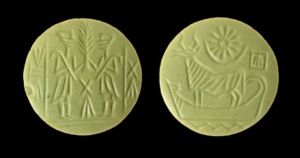News
Danish archaeologists find 3,500-year-old gemstones
This article is more than 8 years old.
Discovery on Kuwaiti island sheds light on previously unknown period

Ancient stones are shedding light on a dark time (photo: Moesgaard Museum)
Danish archaeologists from Moesgaard Museum have discovered the remains of a jewellery workshop on a small island in Kuwait, which includes semi-precious stones that are 3,500 years old.
The discovery provides new knowledge about a somewhat unknown period in history, according to videnskab.dk
Danish archaeologists have been working on the tiny island of Failaka off Kuwait’s coast for the past nine years. The recent discovery offers clues to the period between 2100 and 1700 BC when the island was home to the Dilmun culture and part of the support structure for trade to the major cities in Mesopotamia, which is modern-day Iraq.
Shedding light
Dilmun was the ancient name of a country somewhere in the Persian Gulf. Researchers have defined it as including Bahrain and Failaka and possibly Qatar. It was an important hub for trade during the Bronze Age.
The trading network collapsed completely around the year 1700 BC and the temples and cities were abandoned, leading to a ‘dark period’ about which little is known. The Danish discovery sheds a little light on the darkness.
“We have found the remains of a jewellery workshop in buildings from the period between 1700 and 1600 BC,” said Flemming Højland, the senior scientist and curator at Moesgaard Museum. “We found bits and pieces of semi-precious stones that do not exist naturally on the island of Failaka, but were imported – probably from India and Pakistan.”
Baubles and beads
Kristoffer Damgaard, an assistant professor in the department of Cross-Cultural and Regional Studies at the University of Copenhagen, believes that Højlund and his colleagues have made an important discovery.
“I have no doubt that this is an important and historically crucial discovery,” said Damgaard. “These are the raw materials for luxury items for the wealthy that reveals the local elite had the option of long-distance trading in commodities such as precious stones.”
New knowledge
Damgaard said that the find is an “example of how far back globalisation extends”. Højlund believes that the stones show that Kuwait resumed trade during the dark period.
“Kuwait must have re-established the trade routes that collapsed around the year 1700 BC,” he said. “It bears witness to a renaissance in Bahrain and Failaka in around 1600 BC, when it resumed relations eastward to Pakistan and India.”
READ MORE: Archaeologists seeking answers about Denmark’s human sacrifice past
Damgaard is critical of the term ‘dark age’ for the time period from which the semi-precious stones originate.
“’Dark ages’ are not uneventful periods of time, just periods we know nothing about,” he said.






































